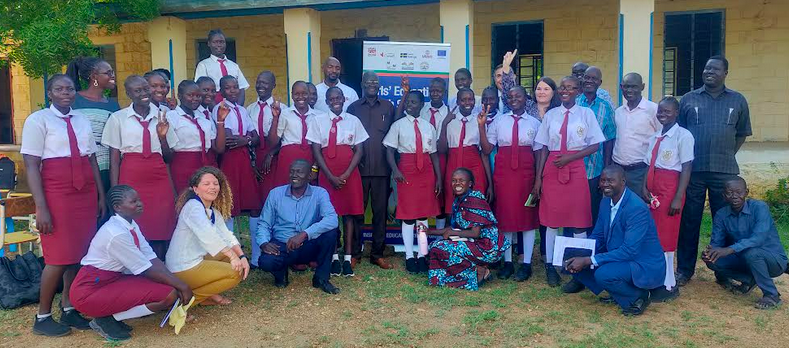The Girls Education South Sudan (GESS) program opened a window of hope for vulnerable girls who would otherwise be out of school or even prematurely married off as underage brides.
In a country debilitated by war and its effects, a paltry budgetary allocation by the government to the education sector, and where more than 2.8 million children (70 percent) are out of school, GESS was a God-sent project.
The program which has now run for six years gives school girls cash stipends to buy necessities to keep them in school and the key donors are the United Kingdom, Canada, Sweden, USAID, and the European Union.
The donors on Tuesday celebrated reaching one million school girls since the inception of the GESS program by visiting Juba One Girls Secondary School where they met some of the beneficiaries of GESS.
Kobi Bentley, the Development Director at the British Embassy in South Sudan, said they are extremely proud to have played a role in supporting girls’ education through GESS’ phase one and two and are very excited at hitting the one million girls mark receiving transfers.
“The cash transfers are having an impact and they are having girls come to school, stay in school and they are helping girls buy the things they need to enable them to stay in school whether they are books, sanitary products, transports, etc.,” she said. “So, we are pleased to hear from the girls directly about the impact that it is having and we look forward to continuing to support education in South Sudan along with a greater contribution from the government in investing in the education sector.”
For his part, Richard K. Adzei, the of Director Education and Youth at the United States Agency for International Development (USAID) called on the government of South Sudan to contribute more to funding the education sector while donors also play their role in securing the future of the South Sudan’s young girls.
“We are marking one million girls reached in South Sudan which is a huge accomplishment. They appreciate it and I think everyone should appreciate and keep in mind that with this fantastic courtesy of people from the UK, Canada Sweden, the U.S., and the European Union, there are one million reasons why the government needs to step up,” he said. “As donors, we are doing the best that we can to help but it is not enough in our ability to do it all. It is kind of our ability to inspire and motivate and encourage the government to also do their part to compliment what we are doing.”
The school girls told of how by completing their secondary education, they hope to go on to become nurses, lawyers, pilots, and doctors.
Esther Keji Luka, a senior three student at Juba Girls Secondary School said the project has supported her since she was in primary school. She said that being an orphan, the money from GESS helped her buy sanitary pads and pay for school fees.
“I have benefited from this (GESS) money so much since when I was in primary five and it helped me. I was the one paying my school fees and I used to work during holidays to get money to pay fees,” she explained. “I lost my parents and stay with an uncle who is a drunkard so he does not pay my school fees nor give me money for my needs. So, I use the money from GESS to buy Always (sanitary pads).”
GESS transfers cash directly paid to girls enrolled in and regularly attending school. All girls from Primary 5 to 8 and Secondary 1 to 4 are eligible and will be targeted over the lifetime of the program.
Alfred Loku, the deputy headteacher at Juba Girls Secondary School, said GESS has helped keep girls in schools and break the cultural barriers of not sending girls to school.
“Due to advocacy and awareness by some organizations, the attitude of sending only boys to school is being discouraged,” he explained. “GESS has reduced the attitudes that our grandparents used to have that it is not important to send girls to school. Even parents are now aware that girls are very important and deserve education as well as boys.”
GESS transfers cash once every year and according to the school girls, last year they received SSP 11,000 and they are looking forward to receiving this year’s transfer.




